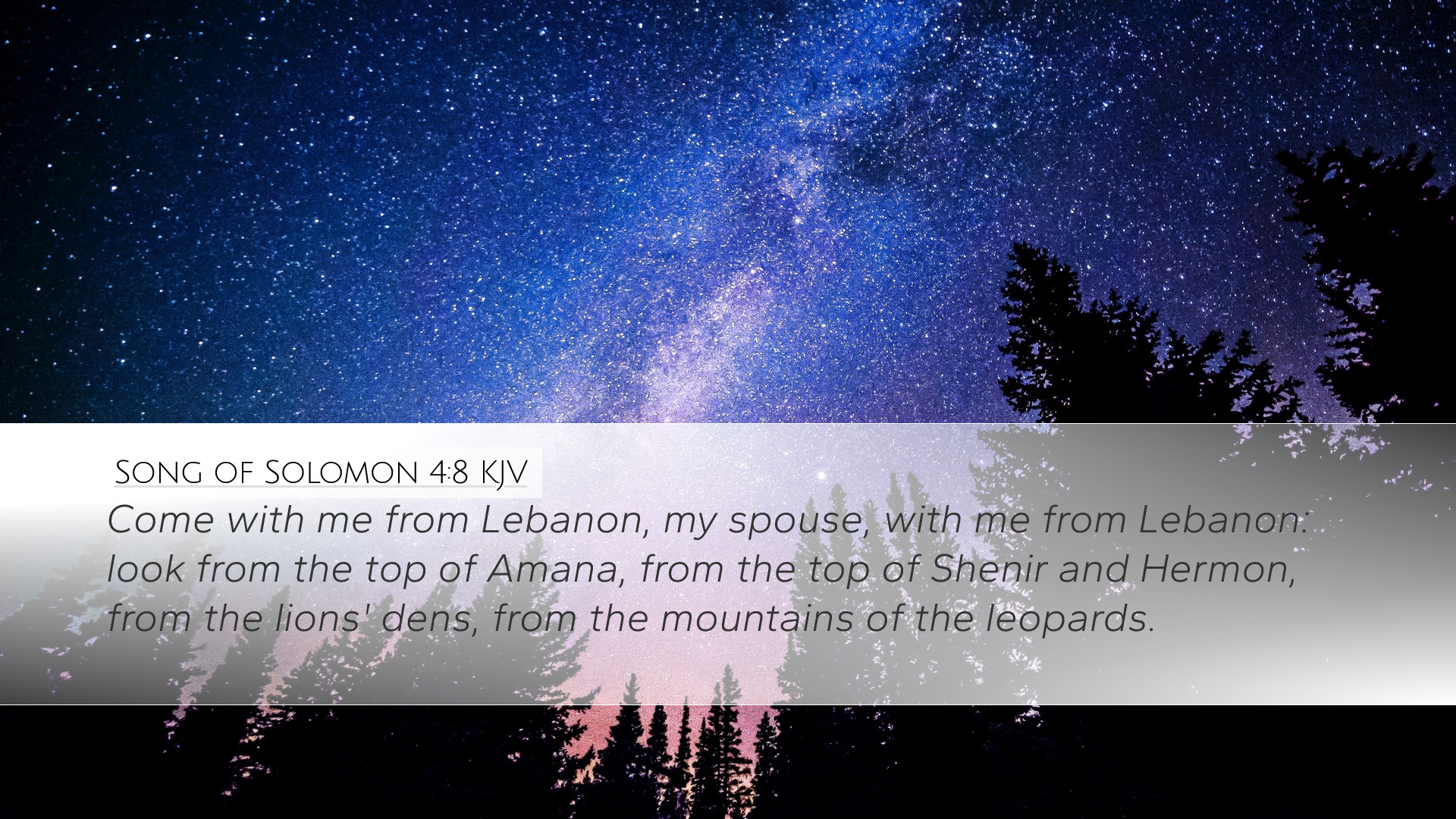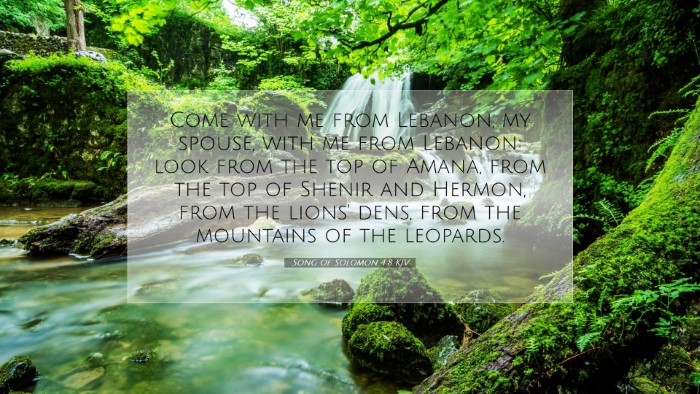Commentary on Song of Solomon 4:8
In the Song of Solomon 4:8, we find a rich text that speaks to the themes of love, longing, and intimacy. This verse invites deep reflection and appreciation for the dynamics of romantic relationships within a biblical context.
Text of the Verse
"Come with me from Lebanon, my bride; come with me from Lebanon. Descend from the crest of Amana, from the top of Senir, the summit of Hermon, from the lion's dens and the mountain haunts of leopards." - Song of Solomon 4:8
Historical Context
The Song of Solomon, traditionally attributed to King Solomon, is often seen as a celebration of love and desire between a bride and groom. Written in a poetic style, the book reflects the culture of ancient Israel and the significance of human relationships.
Setting
The geographical references in this verse evoke images of a mystical journey. Lebanon, known for its majestic mountains and cedar trees, symbolizes beauty and strength. The mention of various mountains presents a ladder of love, ascending from the earthly to the divine.
The Call to Intimacy
The verse encapsulates a call: "Come with me." This invitation can be unpacked through several lenses:
- Invitation to Union: The speaker, likely Solomon, invites his beloved to join him in a promised land of beauty and safety. This symbolizes a call to commitment and unity in the marital bond.
- Journey Together: The mention of descending from the heights can be interpreted as the couple's shared journey. The physical descent mirrors the spiritual journey of mutual understanding and love.
- Escaping the Wild: By acknowledging "lion's dens and mountain haunts of leopards," the speaker recognizes threats that surround their love. The call to move away from danger evokes the protective nature of true love.
Spiritual Implications
As the commentary by Matthew Henry highlights, the language of the Song of Solomon extends beyond human relationships into the realm of spiritual love between Christ and His Church. The beloved’s journey can be seen as a transformation from the worldly to the divine.
Symbolism
Albert Barnes elaborates on the profound symbolism in the text, portraying Lebanon as a place of divine revelation and spiritual elevation. The mountains mentioned, such as Hermon, symbolize the heights of divine communion and the richness of spiritual experiences.
The "lion's dens" and "mountain haunts of leopards" speak to the dangers that lovers must navigate in their relationships. It emphasizes the need for vigilance and protection in love.
Literary Elements
The use of parallelism in poetic structure enhances the beauty and depth of this passage. Each geographical reference serves to build upon the theme of progression in the relationship, inviting the reader to envision the journey together.
Imagery of Nature
Adam Clarke notes that the overwhelming beauty of nature referenced here serves to embody the beauty of love itself. As God’s creation manifests in the mountains and wilderness, the love shared between the couple reflects the Creator’s glory.
Application for Today
This verse offers vital insights for pastors, theologians, and students of scripture. It encourages a deeper understanding of romantic love as reflective of God's love for humanity. Here are some points for contemporary application:
- Understanding Love as a Journey: This verse teaches that relationships are ongoing journeys that require intentionality, vulnerability, and courage.
- Protection in Relationships: The imagery of danger surrounding true love reminds us of the need for boundaries and careful nurturing of romantic bonds.
- Spiritual Dimensions of Love: Practicing love within a spiritual framework can elevate personal relationships and align them with divine principles.
Conclusion
In conclusion, Song of Solomon 4:8 serves as a profound reminder of the beauty, complexity, and depth of love. Coupled with insights from renowned public domain commentaries, this verse can guide spiritual leaders and scholars in understanding both the earthly and divine aspects of love. It encapsulates the call to love, journey, and protect, encouraging readers to reflect on their own relationships while drawing parallels to the divine relationship with God.
Reflecting on these themes in their studies allows scholars to appreciate the multilayered romance portrayed in this passage, fostering a richer understanding of both scripture and the human heart.


